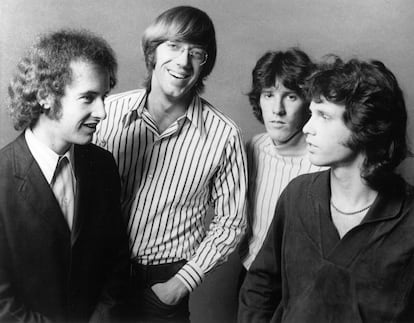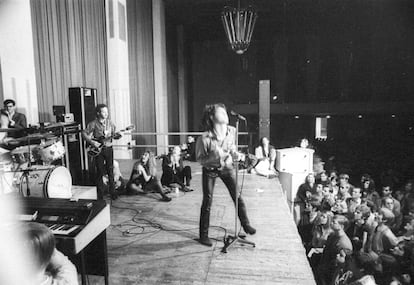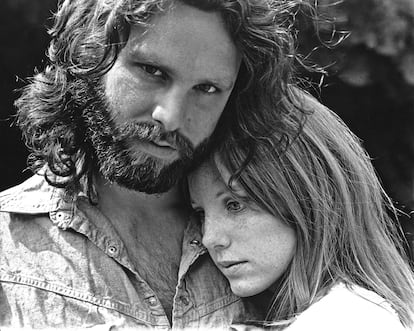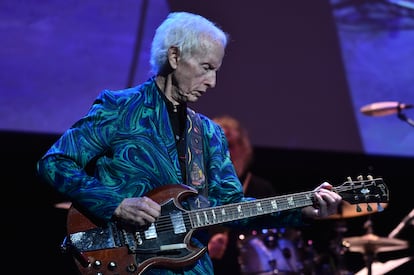‘Jim had his demons, but he exorcised them on stage’: Robby Krieger on the lies that fed the legend of The Doors
In a book that has just been released in its Spanish edition, the quartet’s guitarist debunks stories about the group, unravels Jim Morrison’s persona and recounts the history of a seminal rock band

The most infamous episode in the history of The Doors never happened. After a concert in Miami in 1969, 15 further shows were canceled, the band lost a million dollars, their songs were banned from many US radio stations and Jim Morrison, their lead singer, was sentenced to six months in prison, which he avoided by paying $50,000 bail. The Doors’ career was marked from that moment on and they never fully recovered. What happened in Miami? It was said that Morrison had unzipped his fly and simulated masturbation; then, he ran over to guitarist Robby Krieger, knelt down and made movements that were interpreted as representing fellatio. Today, Krieger states: “Quite simply, none of that happened.”
Krieger published a book last year, Set the Night on Fire: Living, Dying, and Playing Guitar with the Doors (now available in Spanish) in which he unceremoniously unravels Morrison’s personality, debunks stories about The Doors (some of which featured in Oliver Stone’s 1991 movie The Doors), reveals his own belated addiction to heroin, analyzes the bitter court battle between the three remaining members of the group over the rights to the band’s name after Morrison’s death and details the history of a seminal band in rock mythology. And the quiet man of The Doors, the composer of classics such as Light My Fire, does so with plenty of irony.
Krieger was the last band member to join The Doors, months after Jim Morrison (vocals) and Ray Manzarek (keyboards) formed the group in Los Angeles, later recruiting drummer John Densmore. “At first I didn’t like it at all. Then I realized that they were so different from anything else that it was difficult to adapt to their style,” Krieger tells EL PAÍS from his LA home. The guitarist did arrive in time to participate in the composition and recording of the group’s debut album, The Doors (1967).

There was nothing like it in that 1967 Summer of Love: a band that exploited theatricality on stage, with a poetic flight in Morrison’s lyrics, inclined to improvisation inherited from jazz and with three great instrumentalists and a magnetic vocalist. And without a bassist in their live performances (during recordings they would hire a bass player). In live shows, the bass sounds were provided by Manzarek’s organ. The Doors were also a band conditioned by the hurricane-like behavior of its singer.
“In the beginning, when Jim and I were writing songs together at my parents’ house, it was wonderful, an unforgettable time. We experimented with LSD and there were no problems. But then Jim started drinking and we got into a crazy environment,” Krieger explains. Much of the time, Krieger, Manzarek and Densmore had to restrain their leader, bring him down to earth, make him understand that he was mortal. They were living with a outstanding artist, gifted in poetry, with a great voice and a powerful ability to transmit. “If he was sober he was the nicest person in the world. The problem was when he drank, and he drank a lot. He was transformed. He was the craziest guy I’ve ever met, without a doubt,” Krieger says with a smile.
Krieger almost always positioned himself to the left of Morrison, playing with a mixture of purity and rock rebelliousness. He and Morrison were the only ones standing on stage: Manzarek and Densmore played seated. So it was down to Krieger to keep an eye out for the singer’s unpredictable, often violent, alcohol-induced behavior. The Doors’ performances became a magnet for brawls. Concert-goers were fond of tearing out seats and throwing them on stage. There were stage invasions prompted by Morrison himself and often the police would have to intervene, taking the stage or taking someone into custody.
But on March 1, 1969, in Miami, there weren’t any chairs to throw because the promoters had already removed them. “In fact, we said goodbye to the cops absolutely peacefully. Jim said ‘fuck you’ from the stage, as he had at every concert for three years. But everything was more or less normal. And suddenly we were making headlines,” says Krieger. A search warrant was issued for Morrison. He was charged with indecent exposure and using offensive language in public. The singer turned himself in to the police. “The trial that followed haunted us throughout our career. For the first time, Jim suffered the consequences of his actions. And, on top of that, it was the only time when the consequences were completely unfair,” he recalls.

Krieger’s lie detector alights on Stone’s 1991 biopic, which starred Val Kilmer “brilliantly” portraying Morrison, says the guitarist. He complains that the director presents a drunken and cocky Morrison. “I’m not saying he didn’t drink and he wasn’t unbearable at times, but he didn’t go around all day with a bottle in his hand. He was a shy, funny person. And when he went too far he would accept it the next day and feel bad. He had a character that made you feel like his best friend.” More to the point: the singer appears in the film as a womanizer, but his girlfriend, Pamela Courson, was just as open, the guitarist points out. Nor did the audience dance naked and light bonfires at Doors concerts, as in Stone’s movie. “The film succeeded in resurrecting public interest in the group, but it also alienated a lot of potential fans because they saw Jim as a shallow, drunken prick. And he wasn’t,” says Krieger.
Beyond the film, another story that has endured is that Morrison moved with Courson to Paris because he was disenchanted with music and wanted to dedicate himself to poetry. Krieger also doubts this: “Where he felt fulfilled was on stage. Even in Paris he couldn’t resist taking part in concerts with a local band. Jim had his demons, but he exorcised them on stage.” At one point in the book, Krieger appears to glean some happiness at Morrison’s death. “Well, happiness is not the word. I would say relief. It’s like he finally got what he wanted. Jim was always talking about knowing what happened after death. And I really think that’s what he wanted. So I was relieved for him.”
Morrison died on July 3, 1971 in Paris aged 27. The official report said the cause was a heart attack, but there were always suspicions that it was a heroin overdose: no autopsy was performed. Many Doors fans have not forgiven the rest of the band for carrying on without Morrison. They released two subsequent albums with Krieger and Manzarek on vocals. “Today it seems like a ridiculous decision, but back then it had a certain logic. We had no choice: we didn’t know how to do anything else and we had signed a contract to put out two more albums. There are some songs from those [Other Voices, 1971, and Full Circle, 1972] that I’m proud of. Maybe we should have hired a singer, but they would have been all over us too: replacing Jim Morrison, how could they do that!” Years later they did consider a vocalist, Ian Astbury from The Cult, but at that time, in the early 2000s, they could no longer use The Doors name because Densmore, who had decided to quit the group, took them to court. The drummer won and Manzarek and Krieger had to tour under names like The Doors of the 21st Century. Pamela Courson died of an overdose in 1974, also at the age of 27.

Krieger has a son and has been married to his wife, a former girlfriend of Morrison’s, for 50 years. Manzarek never accepted the singer’s death and claimed he was still alive (no images of Morrison’s body were released). With his innate wryness, Krieger signs off: “Well, the truth is I’ve never seen anyone who looks like Jim. But I’m still keeping an eye out just in case.”
Sign up for our weekly newsletter to get more English-language news coverage from EL PAÍS USA Edition
Tu suscripción se está usando en otro dispositivo
¿Quieres añadir otro usuario a tu suscripción?
Si continúas leyendo en este dispositivo, no se podrá leer en el otro.
FlechaTu suscripción se está usando en otro dispositivo y solo puedes acceder a EL PAÍS desde un dispositivo a la vez.
Si quieres compartir tu cuenta, cambia tu suscripción a la modalidad Premium, así podrás añadir otro usuario. Cada uno accederá con su propia cuenta de email, lo que os permitirá personalizar vuestra experiencia en EL PAÍS.
¿Tienes una suscripción de empresa? Accede aquí para contratar más cuentas.
En el caso de no saber quién está usando tu cuenta, te recomendamos cambiar tu contraseña aquí.
Si decides continuar compartiendo tu cuenta, este mensaje se mostrará en tu dispositivo y en el de la otra persona que está usando tu cuenta de forma indefinida, afectando a tu experiencia de lectura. Puedes consultar aquí los términos y condiciones de la suscripción digital.









































